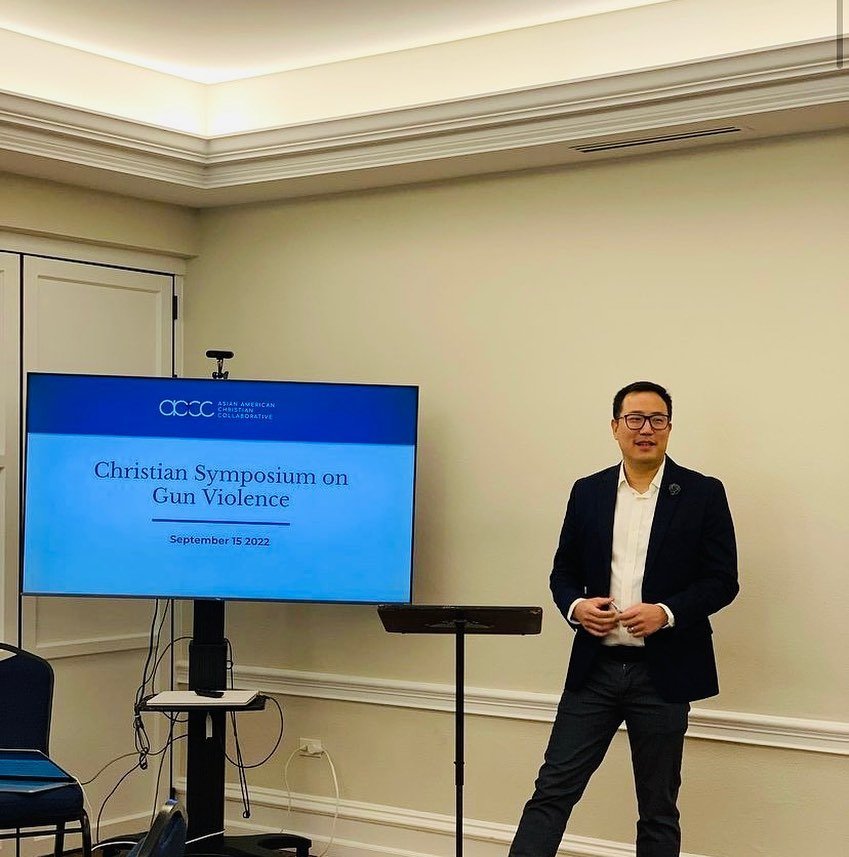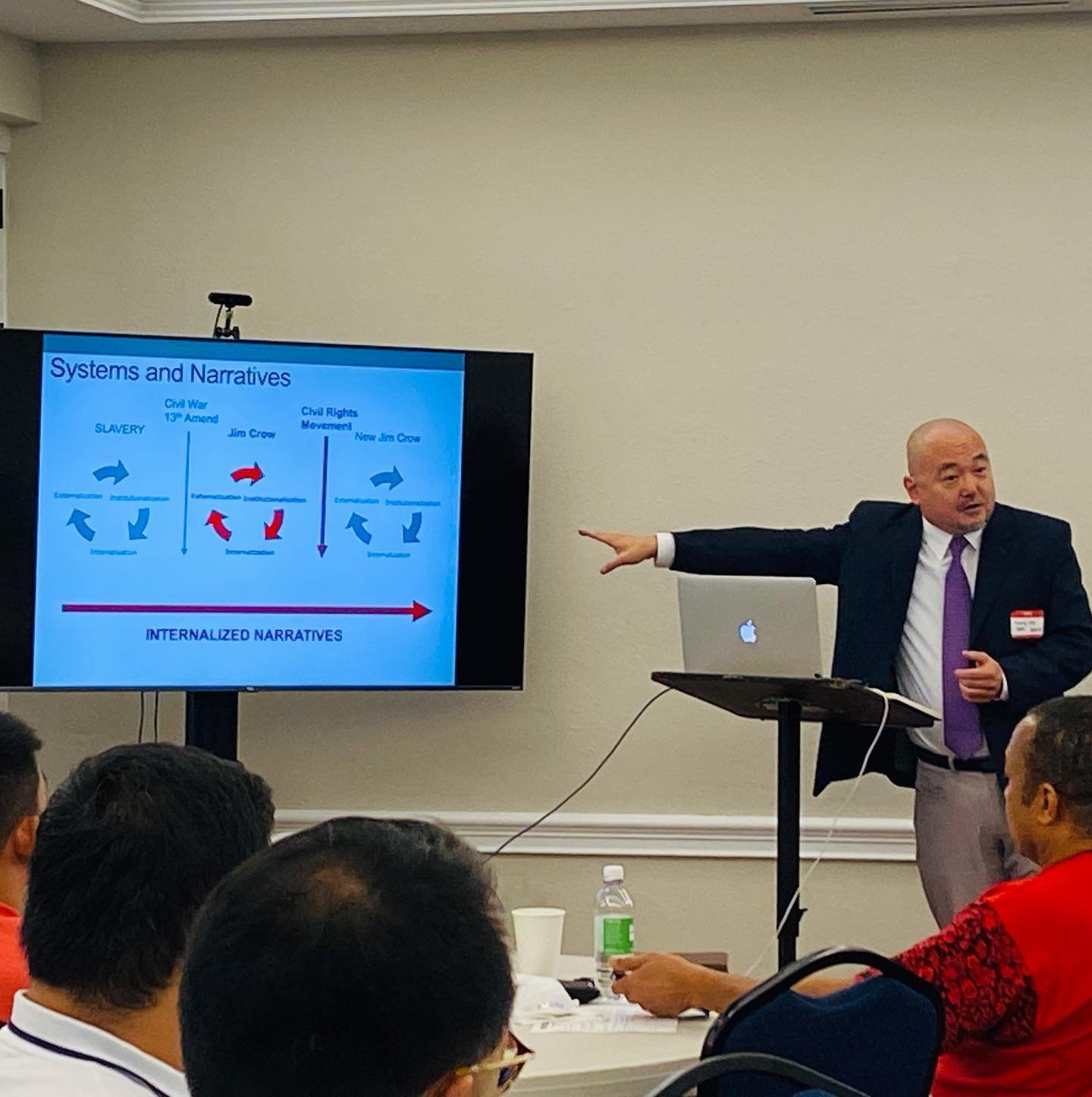Dare to Dream: A Reflection on the AACC Gun Violence Symposium
By Zachary Lee
T
The first thing that struck me as I stepped into the Friends Meeting of Washington Building for the AACC Gun Violence Symposium was the intimate setting. Circular tables adorned the main conference room, but they were also spaced out enough to create easy passage, encouraging people to not just stay in one place but to traverse and meet with the other attendees freely. Though my introverted self would have loved nothing more than to fade into obscurity in a midst of a sea of nameless strangers, with no more than twenty or so people present, there was nowhere to hide. Case in point: as I grabbed my name tag and program, I was warmly welcomed by AACC president, Raymond Chang. Additionally, while I could read about some of the speakers in the paper program (such as Steve Park, Rev. Sharon Risher, and Rev. Dr. Amy Peeler) I could also just stand in line near the breakfast table and swap introductions with them in person.
This ambience of camaraderie and story sharing helped set the tone for the day’s events. The Gun Violence Symposium was born out of a shared belief that “Christians can contribute (and have been contributing) to the [gun violence] discourse in ways that are grounded in a biblical and theological vision of human flourishing - addressing issues of violence, hate, and murder.” The convening meeting in D.C. built upon the work of President Chang and many others to advocate for gun safety. After a series of mass shootings that culminated with the Uvalde massacre, Chang and other leaders drafted and signed a statement speaking out against the multiple shootings that took place over the course of the year, and twice in the span of three weeks, meet with 15 Senate offices and present them with the written statement on gun violence.
In many ways, the gathering at the conference was both a culmination of what the AACC had done before and a hopeful launching point for what it could do in the future. Chang addressed the room before the day’s plenary talks kicked off, sharing how in light of these senseless killings, many Christians knew they wanted to get involved but didn’t know what to do.” Chang also acknowledged that it is easy to step into this space with well-intentioned but unrealistic and lofty expectations of what the day might bring. “Ask yourself ‘God what are you asking of me in relation to this day?’” he shared, “It might be anything beyond just a conversation or the development of a new friendship…but be open!” I was grateful for this charge. I came with a passion and desire to get more involved in gun control advocacy but felt overwhelmed about where I could start. Chang’s encouragement to all of us to ask how God might speak to us personally alleviated the tension that by the end of our time together I’d have it all figured out. Taking a few deep breaths, I opened my notebook and began to take notes.
Undoubtedly, of the sessions that impacted me the most was what Dr. Soong-Chan Rah, Robert Boyd Munger Professor of Evangelism at Fuller Seminary, shared regarding the importance of changing the narratives people often tell themselves about guns. Presenting a theological treatise on the issue of gun violence, he began by explaining how we’re shaped by stories. “There’s a story to where we are now,” he said. Dr. Rah noted that while it is important to change the structures that enable these types of mass shootings (whether that be the fact that it’s easier to get a gun than it is to get a driver’s license etc.), as a society we need to go a step further and reshape the cultural imagination. In his presentation, he shared a disturbing pattern of harmful systems being seemingly destroyed by individuals and events, only for the systems to be reborn. He outlined how slavery was “destroyed” by Abraham Lincoln during the Civil War, but what rose up in its place was the Jim Crow system. While Martin Luther King Jr. and countless other civil rights activists “destroyed” the Jim Crow System, the New Jim Crow rose to take its place. “We keep thinking that if we change the system that will solve the problem,” he shared, “But the system goes merrily along.” He compared the system to a motor engine and the narratives that perpetrate those systems as the fuel. The engine can be destroyed but if the fuel remains and a new system is built, it can continue to perpetuate harm. The “narrative fuel,” i.e. the myths of American exceptionalism, of individual liberties and rights over the well-being of the community, amongst others, are some of the narratives that fuel the systems and destructive legislation when it comes to gun ownership.
As a writer I always knew words and stories were powerful, but what Dr. Rah shared here made me see their connection to systemic power. I wondered: what narratives can Christians offer to counteract the current narratives?
Thankfully though, I didn’t have to look too far. Dr. Rah shared that as Christians, we have a gift to offer to a hurting world: that of a different story. The Christian faith tells of a savior who gave His life willingly to a mob, even if He could bring about violence to save Himself. The Christian faith tells of a savior, who as Dr. Amy Peeler, Associate Professor of New Testament at Wheaton College argued, didn’t let fear of losing His own life, hinder His protection of others lives. The Christian faith tells of a beloved community, one that centers care for the most vulnerable of society.
Additionally, I was grateful for Carolyn Wu, a Govern for America fellow at the D.C. Mayor’s Office, who gave the final reflection of the day. She shared a young person’s perspective and commented on the Pew Research Center results, which found that the percentage of the US population that identifies as Christians would decrease from 64 percent in 2020 to between 35-54 percent in 2070. However, Wu suggested that instead of initially jumping to lament, we should think about why these numbers are decreasing. She shared that something to consider instead of initially jumping to lament was to think about why these numbers might be decreasing. She challenged that the church must realize that they can no longer be silent on justice issues. This is an important inflection point in the church, she reflected, which the younger generation is watching, “How will [the church] engage in the work of justice?” It made me think about the ways the church needs to have both orthodoxy and orthopraxy. To take a stand against gun violence requires more than decrying it from the pulpit, we must go to local legislators and communities to bring about tangible change. How might young people view the church differently if they saw more church members being more proactive on matters of justice?
As Steve Park of Little Lights stated at the beginning of his devotional, “I’m not optimistic, but I also haven’t given up hope.” This characterized me prior to attending this symposium, but I’d like to think that upon leaving, I left with a little more optimism and a more grounded sense of hope. Christians should be at the forefront of lobbies and protests to Congress. Christians should be voting for stricter gun control laws. At the same time though, we don’t just need new systems but new stories to tell. I’m determined to think more tangibly about how we can offer a better story. May we dare to dream.
Photo by Chip Vincent on Unsplash
Zachary Lee is an Online Editorial Assistant at Sojourners. He graduated from Cornell University where he majored in English and minored in Spanish and Creative Writing. When he’s not hopelessly attempting to catch up on his reading list or writing about film, you can find him on Twitter and Letterboxd.
Help us continue the work of empowering voices. Give today.




